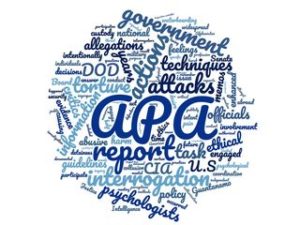Another Crossroads for the American Psychological Association
TRANSCEND MEMBERS, 30 Jul 2018
Roy Eidelson | Psychology Today – TRANSCEND Media Service
Will votes next month mean continued progress toward redeeming the profession?
“America happens to be my client. Americans are who I care about. I have no fondness for the enemy, and I don’t feel like I need to take care of their mental health needs.”
— Bryce Lefever, former U.S. Navy clinical and SERE psychologist, member of the APA’s 2005 Presidential Task Force on Psychological Ethics and National Security
23 Jul 2018 – The President is a big fan of waterboarding, and worse. Secretary of State Mike Pompeo has called torturers “patriots.” New CIA Director Gina Haspel oversaw torture at the agency’s infamous black sites. Chief of Staff John Kelly subjected Guantanamo detainees to brutal treatment. National Security Adviser John Bolton is notorious for dismissing international law. The list is incomplete, but it’s sufficient to make one thing clear: for the Trump White House, inhumanity awaits as soon as the right opportunity arises.
This then is the political climate in which leaders of the American Psychological Association (APA) will meet next month in San Francisco at the annual convention. There they will hold two critical votes, both with important ramifications for whether the APA will again lose its way and stumble badly when next confronted with the stark choice between do-no-harm ethics on the one hand and expediency and careerism on the other.
The first resolution (known as “35B”) aims to allow military psychologists to return to clinical roles with prisoners at sites that operate in violation of international law, such as Guantanamo. To be clear, according to current APA policy approved with overwhelming support, it’s already permissible for independent psychologists (e.g., employed by the International Committee of the Red Cross) to provide mental health care to detainees, and for military psychologists (e.g., employed by the Department of Defense) to provide treatment to military personnel.
In light of Guantanamo’s ugly history of abuse and torture in which military psychologists played key roles, it’s hard to fathom why any prisoner there would choose to confide in a psychologist whose primary duty is to the U.S. government. Rather, there’s good reason to think that the proposed return to these positions is less about the detainees’ welfare than about the Pentagon’s image and interests, while also serving to cover over a sordid legacy. At the same time, if approved, this resolution would eliminate any chance that the Defense Department might turn to independent trauma– and torture-informed experts to support the detainees who remain.
The second resolution (known as “13D”) seeks to remove the 2015 Hoffman Report from the APA website. This independent 500-page report presents a detailed, evidence-based account of APA’s missteps and ethical failures over several years — years during which association leaders secretly coordinated with government officials to support psychologists’ involvement in the Bush Administration’s often-ruthless detention and interrogation operations. However, these troubling findings have led some of the military psychologists named in the report — along with their proponents — to respond with defamation lawsuits in three jurisdictions, a formal ethics complaint and more threats of the same, and now a call for public suppression of the report itself.
 Ironically, the resolution’s sponsors argue that removal of the Hoffman Report is necessary to defend the profession’s “do no harm” principles. But that claim is seriously off-target. Psychology’s fundamental ethical commitments are much more effectively fortified in a very different way: through transparency so that current and future psychologists can better learn the painful lessons of this tragic period in U.S. psychology.
Ironically, the resolution’s sponsors argue that removal of the Hoffman Report is necessary to defend the profession’s “do no harm” principles. But that claim is seriously off-target. Psychology’s fundamental ethical commitments are much more effectively fortified in a very different way: through transparency so that current and future psychologists can better learn the painful lessons of this tragic period in U.S. psychology.
Driven largely by a faction of military psychologists, both of these resolutions are seemingly audacious attempts to take us back in time, to erase from record and memory the reality that psychologists were essential cogs in the Bush Administration’s shameful and misguided war-on-terror torture machine. Approval of these proposals could also open the door wide to the prospect of renewed participation in “dark side” operations, this time on behalf of a president who’s already demonstrated his fondness for no-holds-barred brutality.
At their upcoming meeting, one therefore hopes that APA’s Council of Representatives — including those members who are more recent additions to the leadership and perhaps less familiar with the relevant history — will see through the various self-serving and deceptive arguments behind “35B” and “13D.” For each resolution, a “No” vote is a vote for continued progress toward redeeming the profession.
_________________________________________________
 Roy Eidelson is a member of the TRANSCEND Network and was a member of the American Psychological Association for over 25 years, prior to his resignation. He is a clinical psychologist and the president of Eidelson Consulting, where he studies, writes about, and consults on the role of psychological issues in political, organizational, and group conflict settings. He is a past president of Psychologists for Social Responsibility, associate director of the Solomon Asch Center for Study of Ethnopolitical Conflict at Bryn Mawr College, and a member of the Coalition for an Ethical Psychology. Roy can be reached at reidelson@eidelsonconsulting.com.
Roy Eidelson is a member of the TRANSCEND Network and was a member of the American Psychological Association for over 25 years, prior to his resignation. He is a clinical psychologist and the president of Eidelson Consulting, where he studies, writes about, and consults on the role of psychological issues in political, organizational, and group conflict settings. He is a past president of Psychologists for Social Responsibility, associate director of the Solomon Asch Center for Study of Ethnopolitical Conflict at Bryn Mawr College, and a member of the Coalition for an Ethical Psychology. Roy can be reached at reidelson@eidelsonconsulting.com.
Go to Original – psychologytoday.com
DISCLAIMER: The statements, views and opinions expressed in pieces republished here are solely those of the authors and do not necessarily represent those of TMS. In accordance with title 17 U.S.C. section 107, this material is distributed without profit to those who have expressed a prior interest in receiving the included information for research and educational purposes. TMS has no affiliation whatsoever with the originator of this article nor is TMS endorsed or sponsored by the originator. “GO TO ORIGINAL” links are provided as a convenience to our readers and allow for verification of authenticity. However, as originating pages are often updated by their originating host sites, the versions posted may not match the versions our readers view when clicking the “GO TO ORIGINAL” links. This site contains copyrighted material the use of which has not always been specifically authorized by the copyright owner. We are making such material available in our efforts to advance understanding of environmental, political, human rights, economic, democracy, scientific, and social justice issues, etc. We believe this constitutes a ‘fair use’ of any such copyrighted material as provided for in section 107 of the US Copyright Law. In accordance with Title 17 U.S.C. Section 107, the material on this site is distributed without profit to those who have expressed a prior interest in receiving the included information for research and educational purposes. For more information go to: http://www.law.cornell.edu/uscode/17/107.shtml. If you wish to use copyrighted material from this site for purposes of your own that go beyond ‘fair use’, you must obtain permission from the copyright owner.
